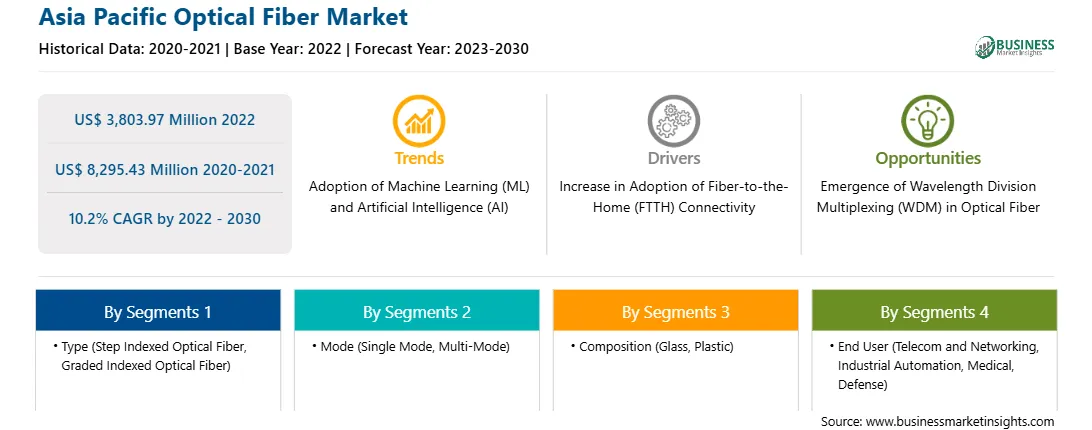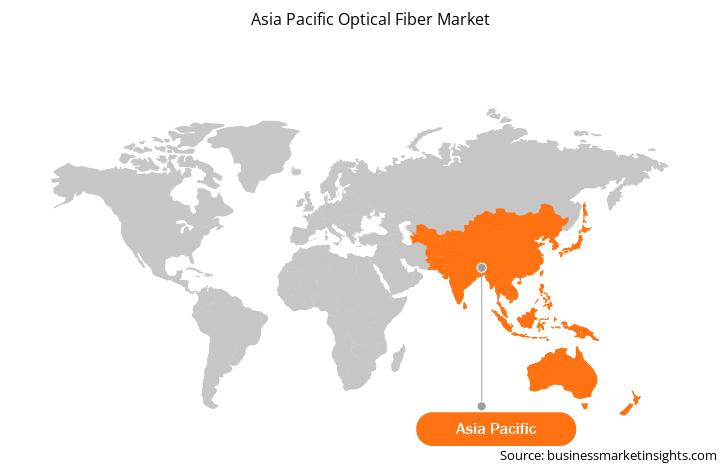The Asia Pacific optical fiber market was valued at US$ 3,803.97 million in 2022 and is expected to reach US$ 8,295.43 million by 2030; it is estimated to record a CAGR of 10.2% from 2022 to 2030.
Adoption of Machine Learning (ML) and Artificial Intelligence (AI) Fuel the Asia Pacific Optical Fiber Market
The increasing advancement in Artificial Intelligence (AI) and Machine Learning (ML) technologies has opened up a world of possibilities across various industries. These transformative technologies are driving innovation, automation, and efficiency, presenting a unique opportunity for the optical fiber market. As AI and ML applications continue to increase, the demand for robust and high-speed data transmission becomes paramount. Optical fiber networks are well-suited to meet the requirements of AI and ML systems because of their ability to handle large volumes of data with minimal latency. These technologies heavily rely on the seamless and reliable transfer of data for real-time analytics, decision-making, and prediction capabilities. The low latency and high bandwidth offered by optical fiber networks enable the transfer of data with minimal delays, ensuring the efficiency and effectiveness of AI and ML algorithms.
Moreover, the increasing adoption of AI and ML in various industry verticals, such as healthcare, finance, manufacturing, and transportation, requires a strong foundation of connectivity. Optical fiber networks provide the necessary infrastructure to support the massive data transfers required by AI and ML applications. The high-speed capabilities of optical fiber enable the rapid transmission of data between servers, cloud platforms, and edge devices, facilitating the seamless operation of AI and ML. Additionally, as AI and ML applications become more sophisticated, the need for edge computing and decentralized data processing is growing. With their ability to connect remote locations and handle high-speed data transfers over long distances, optical fiber networks are essential for enabling efficient edge computing infrastructure. This enables real-time decision-making and reduces the dependence on centralized data centers, ensuring faster response times and improved overall performance for AI and ML systems.
Asia Pacific Optical Fiber Market Overview
Various countries in Asia Pacific are experiencing a dynamic shift toward the technologically advanced landscape with a key emphasis on projects in smart cities, such as the integration of the Internet of Things (IoT) and advancements of healthcare systems. Optical fiber supports these projects by offering a high speed and minimal latency for data transmission and communication in real-time. Furthermore, the increasing use of optical fiber connectors in the region is vital in facilitating reliable and high-speed communications interfaces, which in turn is driving the market.
One of the main factors propelling the market's expansion in Asia is the increasing use of fiber optic cables underwater. In addition to increasing network capacity and spectral efficiency, it has enhanced connectivity between nations. As the need for dependable connectivity and quick data transmission grows, underwater fiber optic cables will probably be utilized more frequently, which will help the regional market expand. For instance, the Asia-Africa-Europe 1 submarine (AAE-1) cable system connects several nations in Asia, the Middle East, Africa, and Europe over a distance of more than 25,000 kilometers. The deployment of the AAE-1 submarine cable system has greatly improved the area's use of deployed fiber. Furthermore, total fiber broadband in APAC accounted for more than 85.1% of the share of the residential fixed-line broadband subscriber base.
Asia Pacific Optical Fiber Market Revenue and Forecast to 2030 (US$ Million)
Strategic insights for the Asia Pacific Optical Fiber provides data-driven analysis of the industry landscape, including current trends, key players, and regional nuances. These insights offer actionable recommendations, enabling readers to differentiate themselves from competitors by identifying untapped segments or developing unique value propositions. Leveraging data analytics, these insights help industry players anticipate the market shifts, whether investors, manufacturers, or other stakeholders. A future-oriented perspective is essential, helping stakeholders anticipate market shifts and position themselves for long-term success in this dynamic region. Ultimately, effective strategic insights empower readers to make informed decisions that drive profitability and achieve their business objectives within the market.

| Report Attribute | Details |
|---|---|
| Market size in 2022 | US$ 3,803.97 Million |
| Market Size by 2030 | US$ 8,295.43 Million |
| Global CAGR (2022 - 2030) | 10.2% |
| Historical Data | 2020-2021 |
| Forecast period | 2023-2030 |
| Segments Covered |
By Type
|
| Regions and Countries Covered | Asia-Pacific
|
| Market leaders and key company profiles |
The geographic scope of the Asia Pacific Optical Fiber refers to the specific areas in which a business operates and competes. Understanding local distinctions, such as diverse consumer preferences (e.g., demand for specific plug types or battery backup durations), varying economic conditions, and regulatory environments, is crucial for tailoring strategies to specific markets. Businesses can expand their reach by identifying underserved areas or adapting their offerings to meet local demands. A clear market focus allows for more effective resource allocation, targeted marketing campaigns, and better positioning against local competitors, ultimately driving growth in those targeted areas.

1. Corning Inc
2. Prysmian Spa
3. Jiangsu Zhogtian Technology Co Ltd
4. Yangtze Optical Fiber and Cable Joint Stock Ltd
5. Fiberhome Telecommunication Technologies Co Ltd
6. CommScope Holding Co Inc
7. Nexans SA
8. Furukawa Electric Co Ltd
9. Sumitomo Electric Industries Ltd
10. Coherent Corp
The Asia Pacific Optical Fiber Market is valued at US$ 3,803.97 Million in 2022, it is projected to reach US$ 8,295.43 Million by 2030.
As per our report Asia Pacific Optical Fiber Market, the market size is valued at US$ 3,803.97 Million in 2022, projecting it to reach US$ 8,295.43 Million by 2030. This translates to a CAGR of approximately 10.2% during the forecast period.
The Asia Pacific Optical Fiber Market report typically cover these key segments-
The historic period, base year, and forecast period can vary slightly depending on the specific market research report. However, for the Asia Pacific Optical Fiber Market report:
The Asia Pacific Optical Fiber Market is populated by several key players, each contributing to its growth and innovation. Some of the major players include:
The Asia Pacific Optical Fiber Market report is valuable for diverse stakeholders, including:
Essentially, anyone involved in or considering involvement in the Asia Pacific Optical Fiber Market value chain can benefit from the information contained in a comprehensive market report.